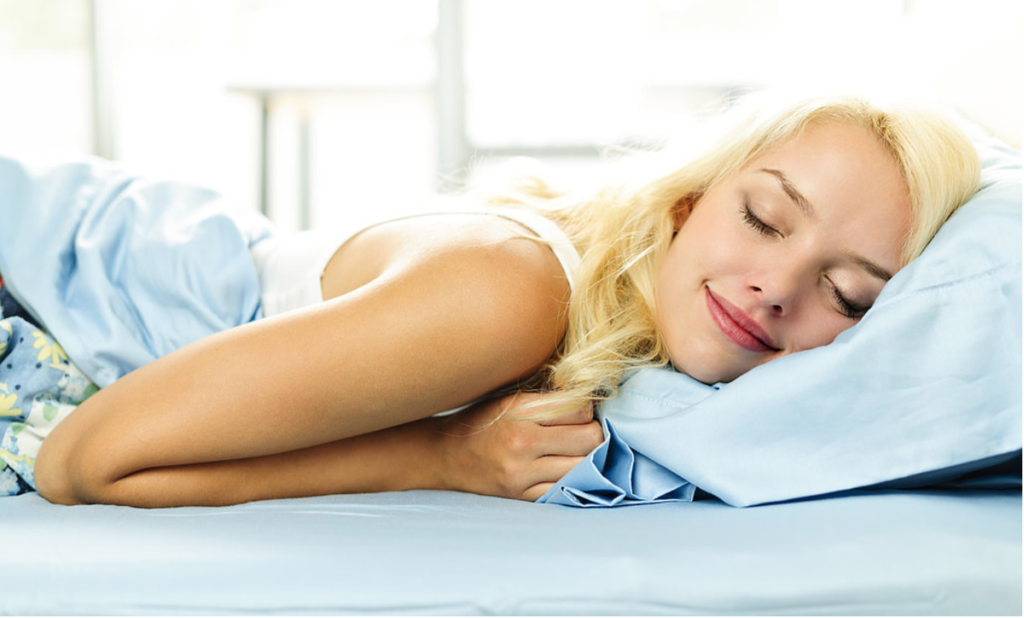
When you have trouble falling asleep naturally, a sleep aid can be a big help.
There are a lot of different herbal and pharmaceutical solutions to helping you fall asleep, and because of that, it can be difficult to figure out the right sleep aid for you.
Each option has advantages and disadvantages. Fortunately for you, our research team dug into the scientific literature to rank the best sleep aids on the market.
1. Luna
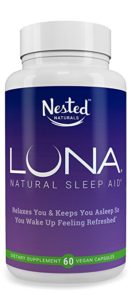
Click here for the lowest price on Amazon
Luna combines several herbal and natural ingredients that have sleep-inducing properties. Its efficacy comes from the combined action of chamomile, valerian root, and a strong 6 mg dose of melatonin.
Without any questionable or ancillary ingredients, it’s a great buy.
2. Zhou Driftoff
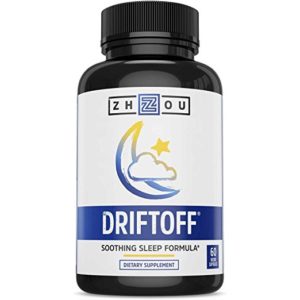
Click here for the lowest price on Amazon
Zhou Driftoff is a robust blend of all the best herbal sleep extracts. It is best suited for people who have trouble falling asleep, staying asleep, or who don’t get restful sleep.
The valerian root, chamomile, and melatonin should work together to counter all three problems.
3. Zenwise Sleep Support
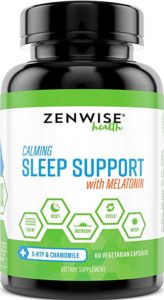
Click here for the lowest price on Amazon
Zenwise has the usual ingredients you’d expect in a combined sleep aid, like theanine, chamomile, and melatonin, but it also includes the neurotransmitters GABA and 5-HTP.
The idea here is not to directly induce sleep with these ingredients, but rather ensure more restful sleep by giving your brain the ingredients it needs to recover while you’re asleep.
4. Sleep Sense
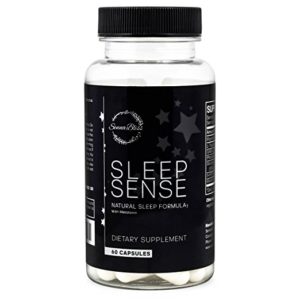
Click here for the lowest price on Amazon
If you want a sleep aid that serves up a lot of neurotransmitters for brain recovery, Sleep Sense is your best bet. It has a moderate doses of melatonin, but a lot of 5-HTP, GABA, and the amino acid theanine.
5. Sheer Health Sheer Sleep
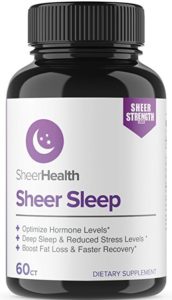
Click here for the lowest price on Amazon
Among the high-quality sleep aids you can buy, Sheer Health has the highest dosage of valerian root, so if you know that herbal extract is particularly helpful for you, it’s a very good choice. It has melatonin, too, but no chamomile or theanine, which you might find in other sleep aids.
6. Kirkland Sleep Aid
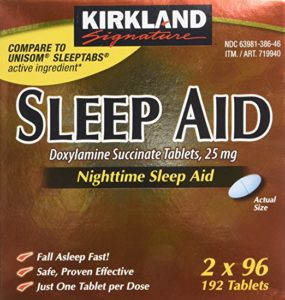
Click here for the lowest price on Amazon
This sleep aid is easily available and popular, but because it’s antihistamine-based, you should only use it occasionally, and you should expect some next-day grogginess. It’s great for rehabbing from jet lag, though, or other short-term uses.
7. Zzzquil
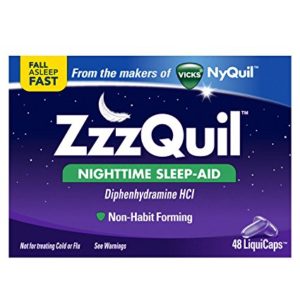
Click here for the lowest price on Amazon
Zzzquil is essentially a version of Nyquil that’s geared specifically towards being a sleep aid instead of a night-time cold and flu medication.
It’s an antihistamine based sleep aid, meaning it is best used occasionally, not on a regular basis, and you should expect the possibility of next-day grogginess.
8. Member’s Mark Sleep Aid
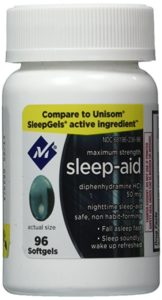
Click here for the lowest price on Amazon
Member’s Mark is another antihistamine-based sleep aid, but it uses a different chemical than Kirkland.
Try this one if you want the fast-acting and powerful sleep inducing effects of an antihistimine, but haven’t had success with doxylamine-based products.
9. Nature Made Soft Gel Sleep
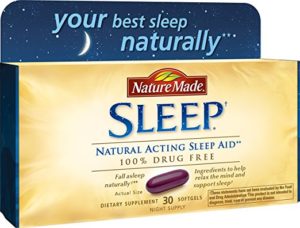
Click here for the lowest price on Amazon
Nature made combines theanine, passionflower, melatonin, and chamomile in a widely-used sleep aid, but aside from the melatonin, the dosages of the other ingredients are probably too low to be effective.
10. Team 6 Star6urn PM
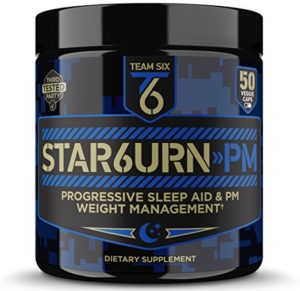
Click here for the lowest price on Amazon
Team 6 has a unique combo supplement–a weight loss supplement and a sleep aid in one. The weight loss effects come from green coffee bean extract, garcinia cambogia, and a few other herbal ingredients, while the sleep inducing effects come mostly from melatonin.
It’s a neat idea, but the stimulating effects of the fat burners might counter the effect of the melatonin.
Part Two: Sleep aid benefits and side effects
Sleep disturbances come in many forms–an inability to fall asleep, an inability to stay asleep, or a lack of restful and restorative sleep. Regardless of the sleep disturbance you have, there may be a sleep aid that can help.
There are several different options for supplemental treatment of poor sleep. These include valerian root, melatonin, chamomile, and antihistamine-based sleep aids.
Each of these has benefits and drawbacks, and there is a wide range of variation in the amount of scientific research that supports these various sleep aids.
Benefits
The most popular and perhaps most useful sleep aid is melatonin. It is a naturally produced hormone that your body uses to set the timing of its internal clock.
In a healthy person with no sleep disturbances, melatonin levels start to rise when the sun goes down, and they induce sleepiness. Melatonin also seems to play a role in keeping you asleep and ensuring that you get restful and restorative sleep.
According to a 1994 scientific case series by J.E. Jan, H. Espezel, and R.E. Appleton, melatonin is an effective sleep aid when it comes to speeding up the onset of sleep and increasing the quality of sleep during the night (1).
They report on a series of patients at their office who had severe and chronic sleep disturbances. Some weren’t falling asleep immediately, while others would wake up restlessly throughout the night.
Jan, Espezel, and Appleton report that melatonin, delivered in a dose of 2 to 10 mg prior to going to bed, had a marked effect on all of the patients. Many recovered completely.
Other research published in the prestigious medical journal The Lancet demonstrated that melatonin is effective and improving sleep quality in elderly patients (2).
Even among older people who are totally healthy, the average quality of sleep is lower than in young people. As such, the researchers wanted to examine whether modulating melatonin levels would affect sleep quality.
Their study used a randomized and placebo controlled design, meaning that the participants were split into two groups and randomly assigned either a melatonin supplement, or a placebo to act as a control.
The researchers found that the melatonin supplement significantly increased sleep quality: disturbances in sleep decreased in the group taking the melatonin supplement, though total sleep time didn’t change.
This is actually good news, because it means that you’re not going to sleep in very late if you take melatonin. You’ll fall asleep earlier, you’ll get higher quality sleep, and you’ll sleep for the same amount of time.
Another sleep aid worth looking into is valerian root. This herbal extract has long been reputed to have a beneficial effect on sleep quality, but studies into its biological effects on the body weren’t published until the 1980s.
One widely-cited article published in the journal Pharmacology Biochemistry and Behavior found that an aqueous solution derived from the valerian root increased sleep quality, as assessed by a subjective survey (3).
The study was well-randomized and controlled; the subjects served as their own controls, and took either a valerian root extract or a control on random nights throughout the study’s duration.
Even though the survey on sleep quality was subjective, the subjects didn’t know which night they were taking a control or taking a placebo, and the results between each condition were different enough to be detected in the survey results.
Valerian root’s efficacy was bolstered by a large, well-controlled study in 2000 by researchers at Humboldt University of Berlin in Germany (4).
They found that valerian root had a substantial impact on sleep quality. Importantly this study looked at both the subjects’ subjective feelings about their sleep and objective measurements of sleep quality as recorded in a sleep lab.
The valerian root extract performed very well when it came to increasing sleep quality and decreasing sleep disturbances, and the incidence of side effects was low (in fact, there were fewer side effects in the valerian root extract group than in the placebo group).
The actual mechanism of action for valerian root is still unclear, but it appears to have an effect on a neurotransmitter called GABA which modulates a great number of psychological functions in the brain, including sleep.
Because of this proposed mechanism of action, valerian root should be considered as a more powerful second-line treatment for sleep disturbances.
Melatonin has a specific, specialized action–inducing sleepiness by changing the body’s internal clock settings–but if that isn’t the cause of your problems, it might not help you. Valerian root has the potential to be a more robust way to treat sleep disturbances in resistant cases.
The most famous herbal remedy for sleep might be chamomile. The plant has a long history of being used to induce sleep, and even now it’s the key ingredient in any “sleepytime” tea you buy at the grocery store.
Initial scientific evidence for the sleep-inducing effects of chamomile came from rats. Researchers at Okayama University in Japan found that chamomile extract had sleep-modulating effects similar to more powerful pharmaceutical sleep aids (5).
When it comes to humans, more insight comes from a review published in 2010 in the journal Molecular Medicine Reports.
The authors cite a number of studies on the basic biology of chamomile that offer circumstantial evidence that it may aid in inducing a deep and restful sleep.
Notably, chamomile does not have the kind of randomized, clinical trials that valerian root and melatonin have. This doesn’t necessarily mean it’s ineffective; it just means its efficacy has not been quantified yet. Still, the initial evidence is promising.
One final category of sleep aids are antihistamine drugs. These are essentially anti-allergy drugs that capitalize on one of the major side effects of these medications–drowsiness.
The same effect that drove pharmaceutical companies to investigate non-drowsy anti-allergy medication also inspired them to reexamine these drugs as vehicles for improving sleep quality.
These antihistamine sleep aids are best used occasionally, not on a regular basis, because you tend to develop a tolerance to their effects (6).
Side Effects
Each the sleep aids discussed above have different side effect profiles, which affects who might want to use them, and in what circumstances.
The side effect profile of melatonin is quite good for most people. There do seem to be some negative side effects in people who have neurological or serious medical conditions, though.
One study notes an increased risk of delirium in elderly patients who were taking melatonin, though it’s worth noting that these were patients who had already been admitted to the hospital for a serious medical condition (7).
Other research discourages using melatonin in children who have neurological disorders (8). However, studies on melatonin in healthy people have not reported any significant side effects, so if you are healthy, melatonin appears to be quite safe. If you have a serious medical condition, you should talk to your doctor first.
Valerian root appears to be more powerful, because it affects basic brain chemistry at a more fundamental level. It does have a few reports of serious side effects: one case study described a patient who had serious heart problems and delirium after he stopped using a valerian root supplement (9).
Another study found that valerian root may interact with medications to cause health problems much like grapefruit does (10).
The upside of this is that if you have any medical conditions or if you are taking medication, you should check with your doctor before taking valerian root.
Chamomile appears to be quite safe, according to a scientific review on the supplement’s properties (11). The only documented side effect in a large trial was an allergic reaction to the plant material in a small amount of people.
As more potent pharmaceuticals, antihistamines suffer from the problem of being too good at what it does. The main side effect is drowsiness the next day.
This has been documented both in subjective surveys and with objective medical scanning (12). You may adapt to this over time, but do expect there to be some lingering sleepiness the next day after you get up.
Recommended Dosage
The appropriate dosage for a sleep aid depends on which one you are using.
Melatonin appears effective at doses ranging from 1-10 mg, while valerian root is typically prepared in the 200-600 mg range, though because there are fewer studies on it, its dosage characteristics are less well-documented.
Chamomile is even less studied, but the best and largest randomized trials have used dosages of 270 mg per day to treat insomnia. Antihistamines work best when used in doses of 25-50 mg.
Recap
When it comes to treating sleep disturbances with supplements, you have a lot of options.
For most people, melatonin is the best place to start, given its highly specific mode of action and its relatively safe side effect profile.
But if your circadian rhythm isn’t the source of your problems, valerian root, chamomile, or antihistamines (or some combination) could be a better solution.
Just be sure you know the side effect profiles of each, and choose the one or the combination that offers the best chance of solving your sleep problems.
https://bodynutrition.org/sleep-aids/
No comments:
Post a Comment